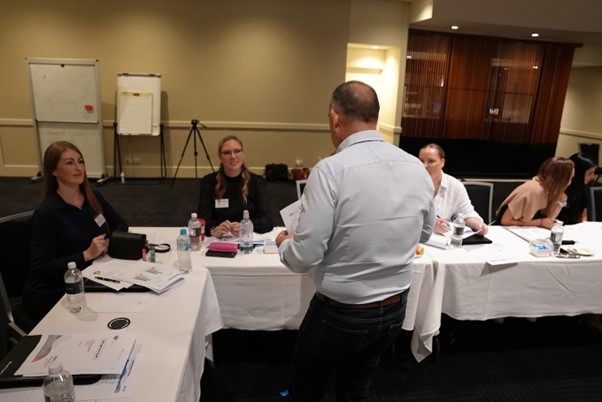Leadership is not just about holding a title or occupying a position of authority; it’s about inspiring and guiding others towards a shared vision.

“A resilient leader navigates adversity with unwavering strength. They embody determination, inspiring others through challenges. Their clear vision and strategic mindset provide a steady compass. Such leaders embrace failures as learning opportunities, fostering growth. Their adaptability and decisiveness steer the team towards success. In times of turmoil, their calm demeanour offers reassurance. Ultimately, their ability to lead by example, staying resolute amid adversity, kindles a sense of purpose among their followers, propelling everyone forward with newfound resilience.”
– Garret Norris, KONA Group CEO
An effective leader is one who can navigate challenges, motivate their team, and drive positive outcomes. We will explore key strategies that can help you become a more effective leader.

How can I become a more Effective Leader?
One of the most fundamental aspects of effective leadership is leading by example. Your actions and behaviours set the tone for your team.
Your team members are more likely to emulate the same qualities if you demonstrate:
- Dedication
- Integrity
- A strong work ethic
By modelling the behaviours you expect from your team, you create a culture of accountability and mutual respect.
Clear communication is at the heart of successful leadership.
It’s essential to articulate your vision, goals, and expectations to your team members.
- Listen actively
- Ask probing questions
- Ensure that their team members feel heard
Transparent communication builds trust and reduces misunderstandings, enabling your team to work more cohesively.
Micromanaging can stifle creativity and hinder team growth.
An effective leader delegates tasks based on team members’ strengths, allowing them to take ownership and showcase their abilities.
Empowering your team not only boosts their confidence but also creates a sense of shared responsibility for achieving goals.
Emotional intelligence (EI) : The ability to understand and manage one’s own emotions and those of others.
Leaders with high EI are better equipped to:
- Navigate conflicts
- Build strong relationships
- Empathise with their team members
By developing your emotional intelligence, you can create a more supportive and empathetic leadership style.

Clarity in goal-setting
Clarity in goal-setting and expectations is crucial for a focused and motivated team.
Clearly define objectives, timelines, and success metrics.
When team members understand their roles and how their work contributes to the overall mission, they are more likely to remain engaged and strive for excellence.
Effective Leadership Mindset
It’s important as a leader to encourage a growth mindset within your team by promoting ongoing learning and development.
Provide opportunities for skill-building, offer constructive feedback, and support your team’s career aspirations.
A culture of continuous learning leads to innovation and adaptability, crucial qualities in today’s fast-paced business landscape.
Effective leaders are skilled problem-solvers who can navigate challenges and make informed decisions.
In times of uncertainty, your ability to remain composed and adaptable is essential.
Create a culture where brainstorming and creative thinking are encouraged, and demonstrate resilience in the face of adversity.

Celebrating Achievements
Lastly, acknowledging and celebrating achievements, both big and small, boosts morale and motivates your team.
Whether through public recognition, bonuses, or opportunities for advancement, showing appreciation reinforces a positive work environment and encourages sustained effort.
Becoming an effective leader is a continuous journey that requires self-awareness, dedication, and a commitment to personal growth. By incorporating these strategies into your leadership approach, you can inspire your team to reach new heights and achieve lasting success.
Remember, leadership is not about being perfect, but about striving for excellence and empowering those around you.
Contact KONA today to discuss how Leadership Coaching can benefit your business.
Call 1300 611 288 or Email us at info@kona.com.au




 Many people will certainly have higher sensitivity to germs and the risks of spreading infections. This behaviour alone will change many industries. Customers and workers will be more sceptical of close contact with others. Consumer travel, dining, entertainment and product preferences will be different moving forward. The list of changed behaviours and their impact will surely be long, though still to be formed as COVID-19 runs its course.
The number of behaviour changes will grow depending on how many people are directly affected, how severely and for how long. Many new behaviours will be normalised as customers practice them repeatedly over months.
Many people will certainly have higher sensitivity to germs and the risks of spreading infections. This behaviour alone will change many industries. Customers and workers will be more sceptical of close contact with others. Consumer travel, dining, entertainment and product preferences will be different moving forward. The list of changed behaviours and their impact will surely be long, though still to be formed as COVID-19 runs its course.
The number of behaviour changes will grow depending on how many people are directly affected, how severely and for how long. Many new behaviours will be normalised as customers practice them repeatedly over months.
 Many customer behaviour changes will require new or modified products and services. New market leaders will emerge while some past leaders fade. Many companies will struggle post COVID-19.
Many customer behaviour changes will require new or modified products and services. New market leaders will emerge while some past leaders fade. Many companies will struggle post COVID-19.

 Understanding what your customers will value in the post-COVID-19 business world and acting on it will ensure your survival and success and put you ahead of major competitors.
These points cannot be over-emphasised – knowing the customer will sort the post-COVID-19 business winners from the competition.
Understanding what your customers will value in the post-COVID-19 business world and acting on it will ensure your survival and success and put you ahead of major competitors.
These points cannot be over-emphasised – knowing the customer will sort the post-COVID-19 business winners from the competition.










































































